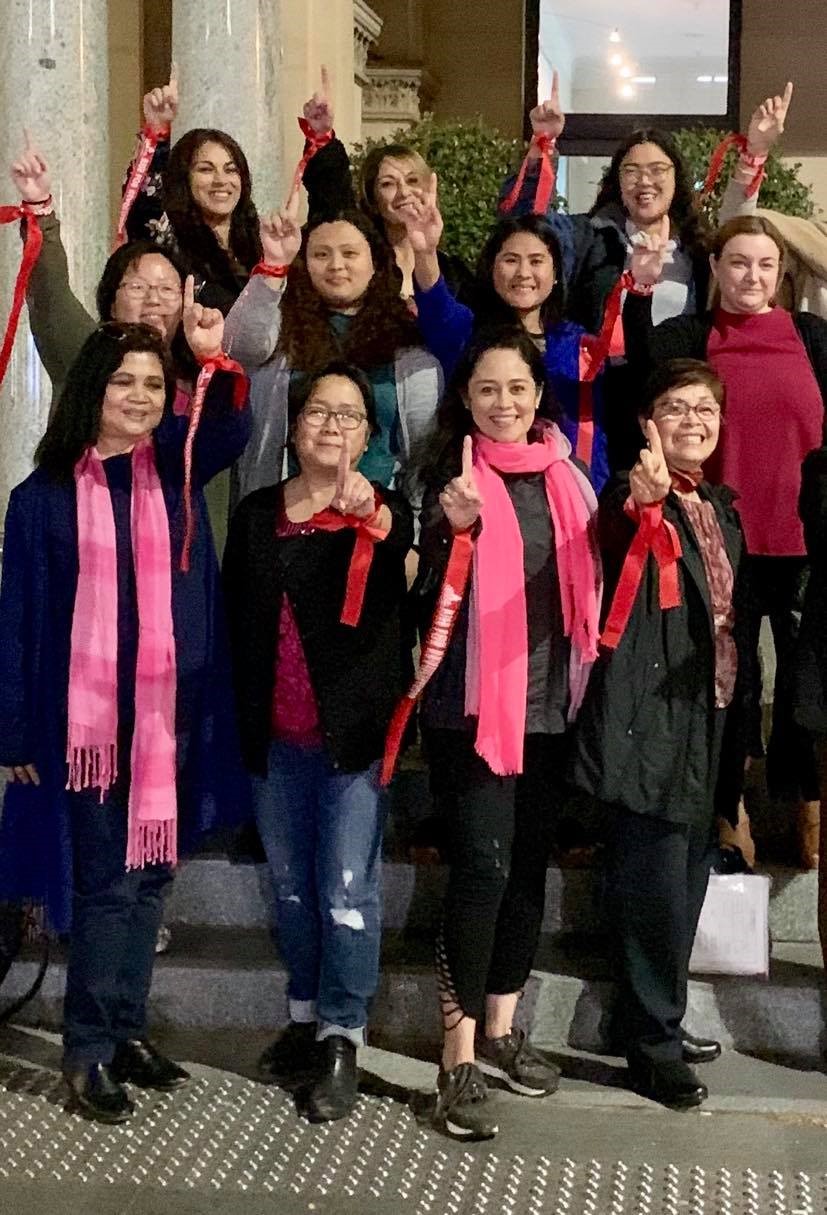 Lina with One Billion Rising activists. OBR is a global campaign to end violence against women and girls.
Lina with One Billion Rising activists. OBR is a global campaign to end violence against women and girls.
The Australian Filipina's second offering for the Breast Cancer Awareness campaign in the month of October is the story of Lina Cabaero. Lina has championed tirelessly on migrant and women issues over the years. She continued with this role passionately even during the battle with breast cancer.
The first time that I was with Lina was in 2014 when we joined the Walk for Respect led by Tony Burke to show opposition to proposed changes to Section 18C of the Racial Discrimination Act.* The proposal by Senator George Brandi was to delete section 18c, but following the strong protest expressed by the people, the proposed amendment was defeated.
Then last year we again met in the protest by Migrante highlighting the need for the proper investigation into the murder of Mhelody Polan Bruno transgender Filipina visiting Wagga Wagga. In this protest, she even led the singing and a bit of dancing in memory of Mhelody. 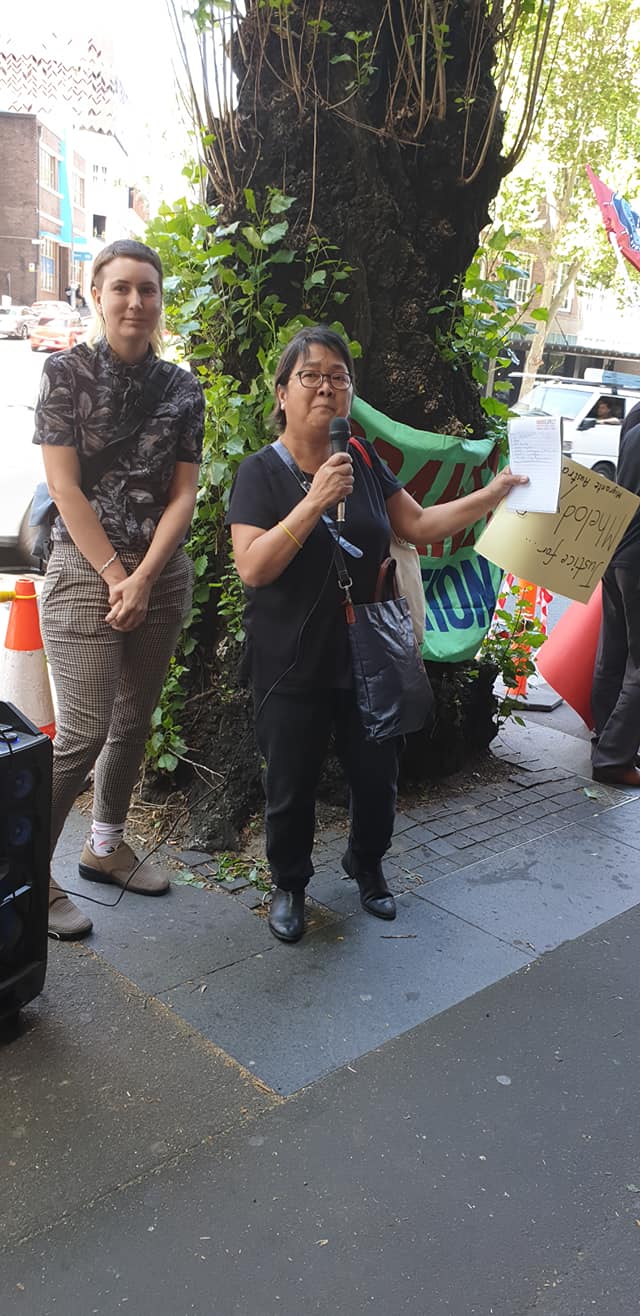
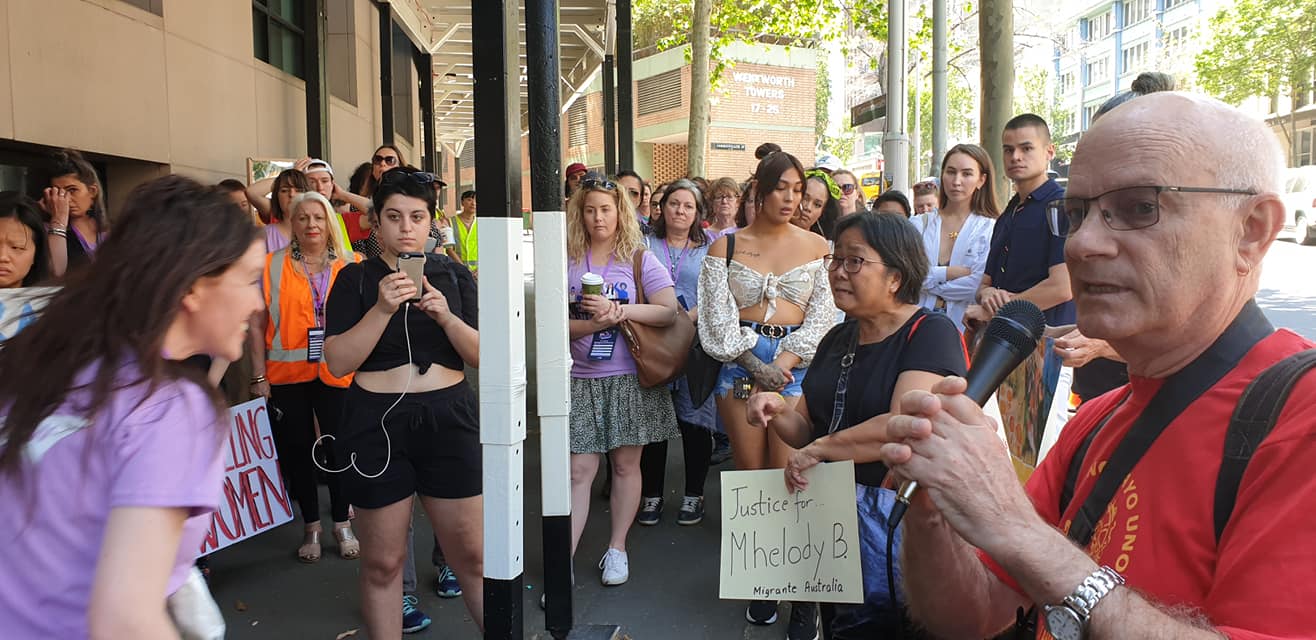
Watching Lina in action, no one would say that this woman of amazing energy was in fact has stared breast cancer in the eyes and licked it!
We are glad to share Lina's responses to a few questions which give us an insight into her persona and take us through her battle with breast cancer and surviving it. Hopefully, it would give hope and inspiration to those who may be feeling in despair as they have been diagnosed or undergoing treatment for breast cancer.
What were you involved with before you migrated to Australia?
I don’t suppose you can call student activism as work but that was what I was doing in the Philippines when I became a student activist (much to the dismay of my parents) in the early 80’s when Marcos’ Martial Law was still in effect. As a student activist in UP Diliman, I was involved with the League of Filipino Students (LFS, the most militant student organisation).
I was also a cultural activist, I sang and played “progressive songs” (socially relevant). I was in a pioneering street theatre group (Tropang Bod-a-bil and UP Peryante). I also played the guitar for the then famous “InangLaya”. From being a campus-based student activist, I came to “work” with the national office of LFS as their National Propaganda Officer. As a student activist in the Philippines, I spent a lot of time in picket lines with workers and in urban poor communities.

In 1989, I was elected to the Secretariat of Asian Students Association (ASA), a regional student alliance of militant and progressive student organisations in Asia-Pacific based in Hong Kong. My “work” involved a lot of writing, travelling, speaking and meetings. This work opened my eyes further on the issue of social justice all over the world.
ASA was based in Hong Kong so I lived in Hong Kong from 1990 to 1997. I did a lot of volunteer work for migrant organisations that looked after and fought for the rights and welfare of domestic helpers. From 1995, I “worked” with the Asia Pacific Mission for Migrant Filipinos (APMMF), the NGO that pioneered grassroots movement building of overseas Filipino workers in Asia-Pacific.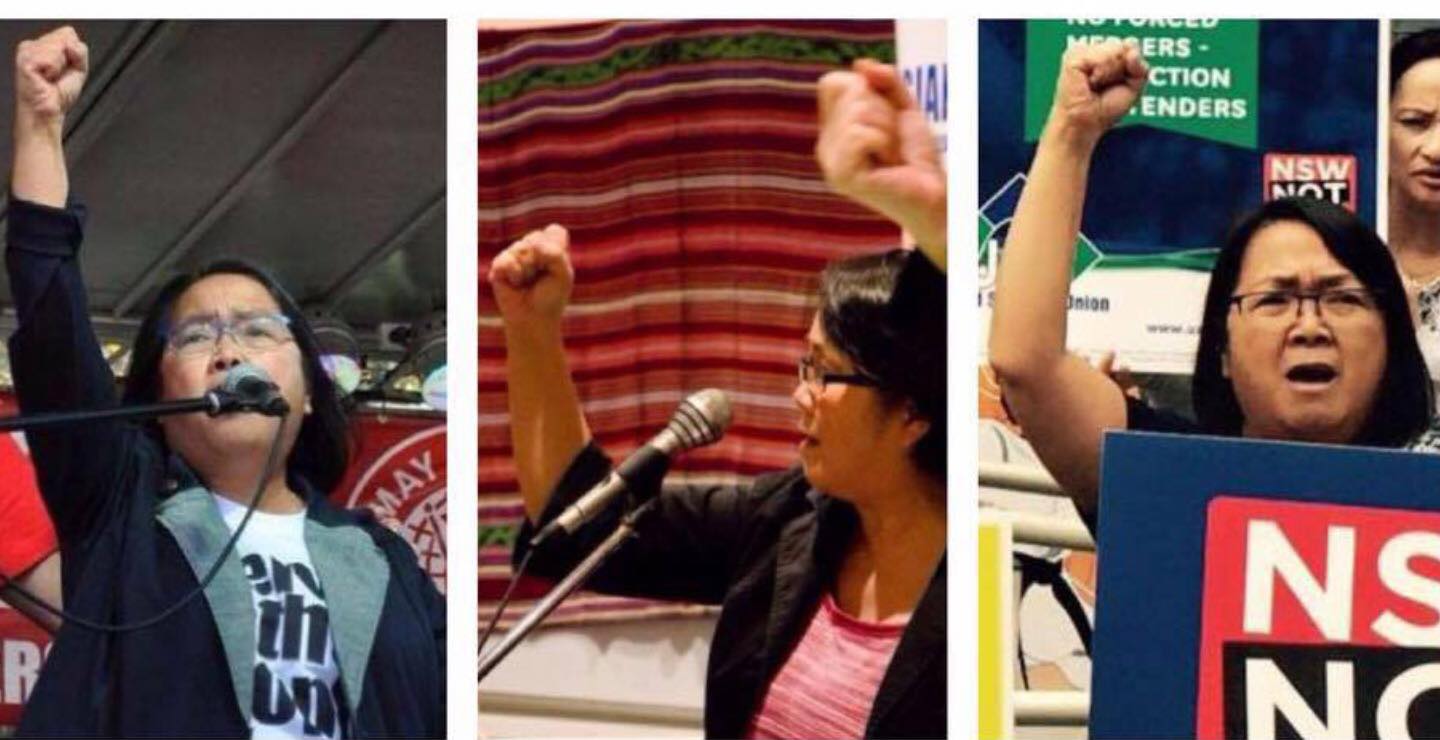 Lina Cabaero addressing protest rallies.
Lina Cabaero addressing protest rallies.
What were your involvements once you settled in Australia?
I migrated to Australia in 1998 and my first job was as campaigns coordinator for AidWatch, an NGO that monitored the Australian aid program in the region and how these aid are causing problems to local populations in those countries.
In 2002, I joined Asian Women at Work Inc and continue to work there as its Coordinator. Ours is a community organisation that assists, empowers, resources and improves migrant women’s lives. We have a network of over 2000 migrant women in Sydney. Our work involves education and outreach, English classes and support groups, social activities and seminars, an evening information and referral service, as well as action groups that take up issues of common concern to our members. Any women from our target group can access our services and activities, not just our members. We are best known for our work with outworkers in the clothing industry, but our members also work in metalwork, food industry, meat work, packing, aged care, nails and beauty, hospitality, retail and so on.
I also continue to work for the Philippine Australia Community Services Inc (PACSI) and Migrante Australia, an organisation that defends and protects the rights and welfare of Filipino migrants in Australia and boldly speaks out on the Philippine government’s labour export program that has shattered the lives of milliions of Filipino migrant workers.
What do you consider fondly to be your achievements?
I haven’t achieved anything on my own. My achievements (if you can call them that) are attributed to team work and collective effort. Possibly my family is an achievement I am very proud of. The longevity of Asian Women at Work Inc and it’s continuing relevance and service to vulnerable migrant women and their families in Australia is a collective achievement. In fact, my so-called achievements have been recognised in several awards eg Summer Hill Woman of the Year in 2018, the Edna Ryan Award in 2016 and the Women of the West Award in 2014. But again all these are awards for the work that I do as Asian Women at Work Inc in the community which is team work involving my staff and our volunteers.
When I first migrated, I faced the challenge of “belonging” to the community sector as there it was “dominated” by other communities who came first in Australia. But being able to work with them in different ways, being able to seek their support and guidance helped in easing this feeling. Running a small but effective community organisation is also an ongoing challenge especially when it comes to funding. Again, it’s about being tenacious and creative in looking for funding – and most of all, by showing the relevance and effectiveness of your work matters a lot.
I want to see as many migrant women overcome the challenges they face when they migrate to this country. I want them to be able to enjoy the support of the community and the government to accomplish such.
How did you find out about having breast cancer?
In July 2008, I felt a lump in my right breast. So I went to my General Practitioner (doctor) who then sent me for mammogram. When on the third week after my mammogram I still didn’t receive the result, I went back to my GP to check if she had a copy of it. She didn’t but she rang the mammogram place. They said the result was not conclusive but they didn’t read the bit that said that because I presented with a lump, I should do further test.
My GP also told me, you are young, you are not in that age group. In October I again felt the lump and since my GP was away, I went to see my daughter’s GP who didn’t waste any time. He sent me for tests including biopsy and in a matter of days it was confirmed that I had breast cancer.
My GP referred me to a breast surgeon who scheduled me for a lumpectomy in a matter of days. I did ask my surgeon to remove my right breast but he said that’s not the way it’s done. I had my lumpectomy but 2 weeks later, a mastectomy because pathology results from lumpectomy confirmed that I had another cancer growing in my right breast!
What was the impact of the breast cancer on you, your family and activities?
Of course I was shocked to find out I had cancer as we don’t have any family history of it. I cried a bit – it felt like it was a death sentence – but when I came to my senses, I asked myself do I want to deal with it or dwell on it. For me to deal with it was the way to fight it so I armed myself with knowledge about my treatment especially its side effects, made sure I prepared myself mentally and physically for the treatment, made sure my family, work and community knew what was happening. And that’s how I fought. I lost all my hair except for 3 eyelashes – and I didn’t even bother to wear a wig. I had 5 cycles of chemo and one year treatment of Herceptin.
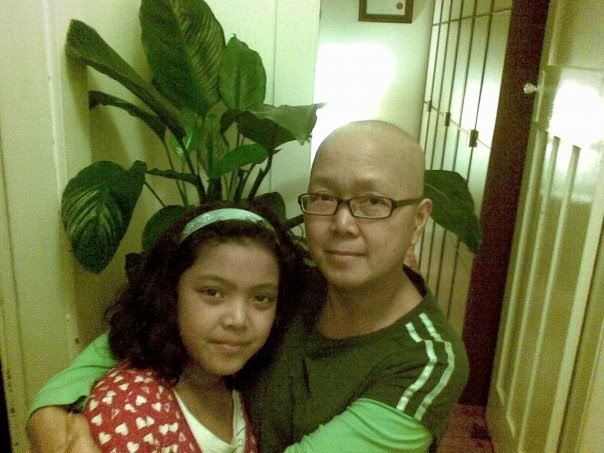 Lina with daughter who was 9 years at the time.
Lina with daughter who was 9 years at the time.
My family was the constant in my life during my treatment. My Mom flew in from the Philippines to look after me. I had prayer warriors worldwide. Friends would send flowers and food. And I am so grateful for all this support.
What advice would you give those who had been diagnosed or undertaking treatment for breast cancer?
My breast cancer journey taught me that the only way to battle cancer is to fight it head on.
Of course, how we respond to treatment will be different – and that’s okay – as long as you have the determination to fight it. There were many ups and downs – and that’s all part of the journey. There are many resources available in the health system and also community support for cancer patients. Avail of them.
Do not dignify cancer. Call it out because it is not invincible.
What is your definition of success?
Success is a way of measuring what one has set out to achieve and sometime, it’s the product of failure or failures. It can be massive (success in the campaign for equal pay for community sector) or something so simple (like for cancer patients, poo-ing can be challenging sometimes so success can be being able to poo).
Nonetheless, I always believe that the successes in my life – be they big or small – were achieved because I had people who worked with me, supported me, held my hand and rooted for me.
ABOUT LINA CABAERO
Lina Cabaero is a Bicolana from Ligao, Albay. She is the oldest of 7 siblings.
She was studying Veterinary Medicine in UP Diliman when on her 4th year of it, she shifted to AB Philippine Studies because of her activism.
She emigrated to Australia in 1998, married to Jega Ponnambalam, a Sri Lankan. They now have two grown up kids - Miko, a graphic designer and a hip hop dancer and choreographer; and Natasha, currently studying Brain Science and Cognitive Studies and Music at Macquarie University and a multi-instrumentalist and singer.
The Australian Filipina wishes Lina good health and thanks her for sharing her courageous battle with beast cancer and continuing good work.
--- - -
* Section 18c of the Anti-Discrimination Act:
Offensive behaviour because of race, colour or national or ethnic origin
(1) It is unlawful for a person to do an act, otherwise than in private, if:
(a) the act is reasonably likely, in all the circumstances, to offend, insult, humiliate or intimidate another person or a group of people; and
(b) the act is done because of the race, colour or national or ethnic origin of the other person or of some or all of the people in the group.